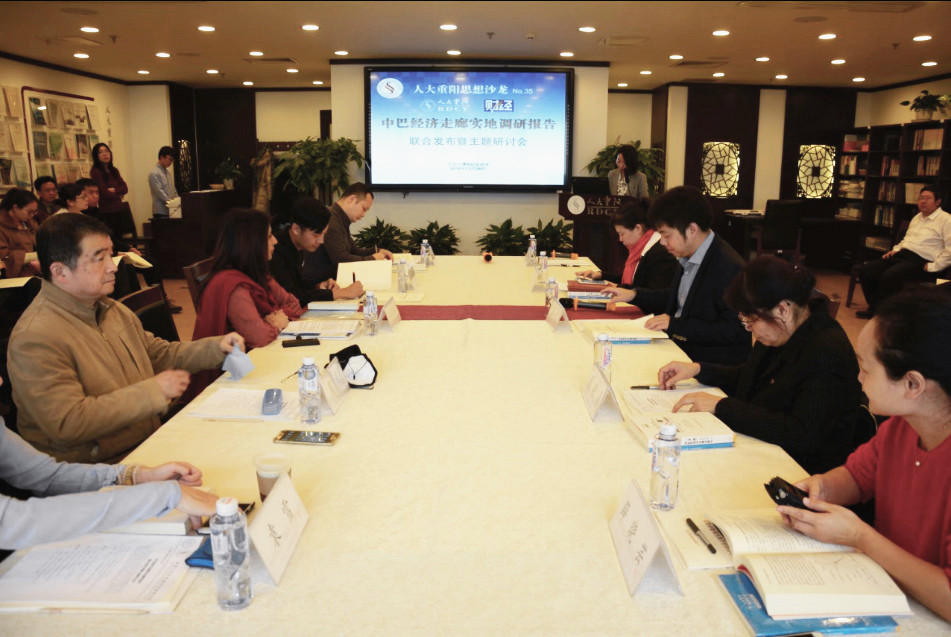Belt and Road
Your Present Location: PROGRAMS> Belt and RoadOperating in Pakistan calls for business savvy, security awareness, report shows
Source: Global Times Published: 2016-12-20

RDCY and Caijing Magazine released a joint research report on the CPEC on Tuesday.
A leading Chinese think tank on Tuesday urged local companies working at the forefront of the China-Pakistan Economic Corridor (CPEC) to be shrewder in business and self-reliant in terms of security to cope with risks in the South Asian country.
The suggestions were included in a six-point proposal at the conclusion of a report on the multi-billion-dollar project. The report was jointly released by the Chongyang Institute of Renmin University of China and Caijing Magazine, after two weeks of field research.
The corridor, which links Northwest China`s Xinjiang Uyghur Autonomous Region with Gwadar Port in southwestern Pakistan, involves investment of up to $46 billion, mostly from China, media reports said.
The CPEC is also seen as the flagship project of the "One Belt, One Road" (B&R) initiative propsed by Chinese President Xi Jinping, according to media reports.
Existing projects under the CPEC will see tangible success by 2017, making it a shining example of cooperation between China and Pakistan, Ahsan Iqbal, Pakistan`s Federal Minister for Planning, Development & Reform, told the Global Times in an interview in April.
In November, a trade convoy of more than 60 trucks carrying Chinese goods for export through the CPEC arrived at Gwadar Port, after setting off from Kashi in Xinjiang. The convoy traveled more than 3,100 kilometers in 15 days, bringing the concept of the CPEC into reality.
Despite these successes, the work of building the CPEC has also been plagued with difficulties, the report released Tuesday said.
Chinese investment has become something to be squabbled over among different parties and region-based factions in Pakistan, and the security environment in the country also poses a hurdle to the completion of CPEC projects, according to the report.
Neither China nor Pakistan can afford a failed CPEC, the report argued. "If the chaos continues, the flagship project will be delayed, and the CPEC will become China`s burden, having an immense negative impact on the B&R initiative it heralded," the report said.
Mao Siwei, China`s former consul-general in Kolkata, India and a South Asian expert, said that the near-term criteria to achieve a successful CPEC are the completion of all the early-stage projects signed during President Xi`s visit to Pakistan in 2015 and the general easing of Pakistan`s energy shortages.
"From a longer-term prospective, the commercial operation of Gwadar Port and the maturing of its free trade area [are also important]. The near-term targets have a high likelihood of success but the longer-term ones face difficulties," Mao told the Global Times Tuesday.
To ensure that CPEC work is carried out according to schedule at a high level of quality, the think tank suggested Chinese companies should develop more insight into the Pakistan market and beef up their security, instead of relying totally on Pakistani support. They should even consider hiring domestic security firms.
Other suggestions include spending more on time and resources on civilian projects to win the hearts of ordinary Pakistanis, boosting people-to-people exchanges and a more even distribution of CPEC projects to allow more regions to benefit.
"Most of the projects under the CPEC are of a commercial nature. Chinese companies should be more professional, and study carefully each contract and each technical specification. The CPEC can never be treated by Chinese companies as some political task, or be hurried, otherwise there will be troubles," Mao said.
In one case, China Machinery Engineering Corp had to pull out from a planned power plant project at the Thar coal field in Pakistan, after taking for granted data and findings provided by the Pakistani side. The coal was found, after examination, to be unable to satisfy the power plant`s requirement. The company now faces lawsuits over the decision, said the report.
"More than a decade ago, when former Chinese premier Zhu Rongji visited Pakistan, the idea of using coal from Thar to burn for electricity was suggested and taken seriously by a Chinese company. It was ultimately abandoned for the same reason. Why has history been repeated a decade later?" Mao said.
To cope with the security situation in Pakistan, which has seen a number of terrorist attacks this year, the report suggested that Chinese companies seek help from domestic security companies.
At present, 15,000 Pakistani soldiers are deployed to protect CPEC, but that number is not enough to cover all CPEC projects. Two attacks aimed at Chinese nationals working under CPEC have been identified so far, according to the report.
"The security of Chinese personnel working on CPEC projects must be the responsibility of the Pakistani side and their safety should be written into projects` contracts. Domestic security firms can play a role, but their role should be auxiliary. Chinese security firms bringing weapons into Pakistan is a very sensitive issue, and it is too early to talk about this now," noted Mao.
Key Words: China; Pakistan; Belt and Road; report























































































 京公网安备 11010802037854号
京公网安备 11010802037854号





